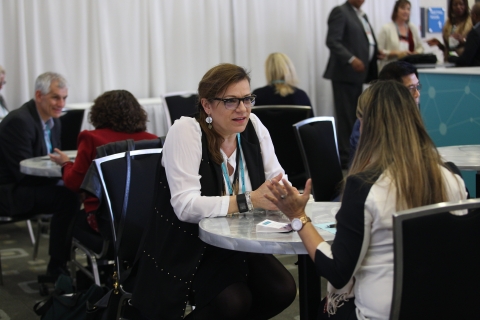With Braindates, PCMA Helped Attendees Receive More Customized Networking and Learning Experiences at Convening Leaders

Imagine turning those sometimes awkward event networking experiences into more meaningful encounters that lead to valuable connections. Attendees at PCMA’s recent Convening Leaders had a chance to do just that with Braindates, an online matchmaking platform that puts like-minded people together to share knowledge face-to-face, one-on-one.
Sort of like Tinder, but for peer-to-peer networking, Braindates was created five years ago by Montreal-based E-180 with the philosophy that everyone has a story to tell and lessons to teach.
Braindates is the brainchild of E-180 CEO Christine Renaud, a former educator and social entrepreneur who recognized that in an ever-growing sharing economy there was a need for a social network that could connect people seeking to give and receive knowledge.
Renaud enlisted the help of Alexandre Spaeth, a computer engineer experienced in working with matchmaking algorithms who was able to adapt that technology to connect people for intentional networking and learning opportunities. The two founded E-180 in 2011 and Braindates was born.
“E-180 started with the goal of transforming cities into peer learning hubs, making it free for regular people so they could learn from one another in coffee shops or other public places,” said Alina Maizel, head of production at E-180. “For the past three years, we’ve been focusing on events because we realized it’s really where our mission can shine.”
She continued, “When people are at events their intention is focused at the event, so it’s a really good time for them to be intentional about connecting with one other. Typically, networking is very spontaneous – you simply hope you can meet the right person. What we’re doing is making it very intentional, so rather than hoping to bump into the right person among (the thousands of attendees) around you, you can book Braindates with the right people for you.”
By removing the barriers to networking, Braindates helps event attendees use knowledge-sharing as a basis for meaningful discussions and connections, in essence, helping to turn conferences into peer-to-peer networking hubs.
Since its founding, E-180 has hosted Braindates at more than 60 events and fostered more than 11,000 Braindates.
When PCMA’s educational programming team got a chance to see Braindates in action at C2 Montreal in 2015, they knew this unique platform would be a great fit for Convening Leaders. After extensive review, the association decide to give Braindates a try for their 2017 conference, held Jan. 8-11 at the Austin Convention Center in Austin, Texas.
“It was clear to me that Braindates would be a way for us to better customize the networking and peer learning opportunities at Convening Leaders,” said Carrie Johnson, senior program manager, education at PCMA.
She continued, “People came to our conference with some major objectives and questions that were top-of-mind for them and through Braindates were really able to pinpoint different participants who could give them some insights into those major questions. That’s another way that Braindates helped us deliver ROI to our participants in terms of the quality of networking and customized education opportunities that were available in the program.”
So how does Braindating work? The process actually starts prior to the event, when attendees access the platform’s online hub, set up their profiles and specify what topics they’d like to teach or learn. Users can then scan through a list of offers and requests for knowledge from fellow conference participants and book 30-minutes meetings with those who match their knowledge needs.
At the event, attendees simply show up at the Braindates lounge at their specified appointment times and are greeted by matchmakers who in turn introduce them to their Braindates.
In the case of last-minute, drop-in Braindaters, matchmakers are also able to help those individuals connect with other like-minded attendees who may have had last-minute cancellations or lack pre-arranged appointments.
“We’ve noticed that those who Braindate tend to do it multiple times,” Maizel said. “We see people who have one challenge and will meet with lots of different people to talk about that one challenge, and other people who are interested in several topics and will meet with lots of people, so it allows for that flexibility.”
She added, “We’ve had people who skipped all their conference sessions and only did Braindates.”
For its inaugural run at Convening Leaders, the platform received a decent reception, with 265 Braindates carried out at the event, according to Johnson.
“People liked the fact that they had a choice and that they were empowered to look, based on what their needs were or what they had to offer,” she said. “It allowed them to be intentional about who they wanted to meet with and why, and have those one-on-one conversations that sometimes get lost in a session.”
Johnson continued, “In the PCMA programming we really feel strongly about having a good portion of our program be interactive and allow for group conversation and discussion, but that doesn’t always give everyone a voice. Braindates gives people that opportunity to have their voice, whether they’re giving or receiving some type of knowledge.”
Besides the obvious value of the Braindating experience onsite, the platform’s value post-show is also of benefit to PCMA, which is currently reviewing data to determine what was most top-of-mind for Convening Leaders attendees – information that could potentially help shape conference programming going forward, according to Johnson.
“There is more and more of an expectation at conferences and events for very customized content and experiences, and with an event the size of Convening Leaders, it makes it very challenging to do that,” Johnson said.
She added, “This was an opportunity for us to allow people to customize and curate their networking and their peer learning experience, which really was a perfect solution for this size of an event.”
PCMA is currently considering using Braindates for next year’s Convening Leaders in Nashville, according to Johnson.
For more information about Braindates and E-180, go here.


Add new comment